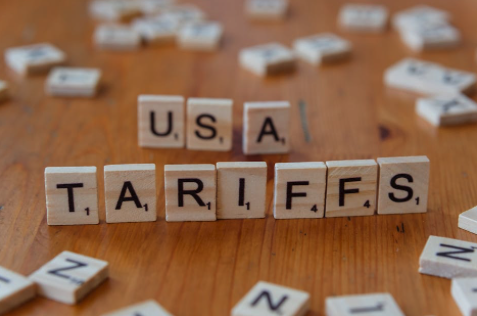Key Points
- On June 4, 2025, the U.S. doubled tariffs on imported steel and aluminum to 50%.
- Goldman Sachs warns that the economic fallout could be severe following the announcement of additional tariffs.
- Financial markets are experiencing volatility due to concerns over rising costs, potential retaliatory tariffs, and broader economic slowdown.

Tariffs have long been a contentious tool in U.S. economic policy, with significant implications for inflation, employment, and overall economic growth. The recent decision by President Donald Trump to double tariffs on imported steel and aluminum to 50% marks a substantial escalation in trade protectionism.
The Trump administration has set a deadline for trading partners to submit their "best offers" on trade by Wednesday, June 4, 2025. This move is part of a broader strategy to press countries into negotiations to avoid further punitive tariffs, which are scheduled to take effect on July 8, 2025.
The White House has indicated that if these countries fail to present satisfactory proposals, the administration will proceed with imposing "massive reciprocal tariffs" on a wide range of imports.
Fact Box
- • Tariffs:
Tariffs are taxes imposed by a government on imported goods and services.
- • Inflation:
The rate at which the general level of prices for goods and services rises over time, leading to a decrease in the purchasing power of money.
- • Recession:
A recession is a significant decline in economic activity that lasts for an extended period – typically two consecutive quarters (six months) or more – across the broader economy.
- • Stagflation:
An economic condition characterized by a combination of stagnant economic growth, high unemployment, and high inflation – a situation that is particularly difficult for policymakers to address.
- • Volcker Shock:
The Volcker Shock refers to the series of actions taken by the Federal Reserve under the leadership of Chairman Paul Volcker in the late 1970s to early 1980s to combat high inflation in the United States. This aggressive monetary policy had significant impacts on the patterns of unemployment in the country.
Economic Implications
Goldman Sachs warns that the economic fallout could be severe following the announcement of additional tariffs - fueling inflation, weakening job growth, and increasing the likelihood of a recession.
Financial markets are already on edge, with equities dipping and bond yields fluctuating in anticipation of trade shocks. Goldman now forecasts that core inflation - excluding food and energy - will climb to 3.5% in 2025. That’s a full half-point higher than their earlier estimate and significantly above the Federal Reserve’s long-term target of 2%.
Such a move could reignite fears of “stagflation,” a damaging mix of stagnant economic growth and rising prices, unseen in the U.S. since the late 1970s. During that era, the Fed, under Chair Paul Volcker, was forced to hike interest rates dramatically, ultimately pushing the economy into recession to bring inflation under control.
While a Volcker-style rate shock is not expected this time, Goldman does foresee the Fed responding with monetary easing. The bank now expects the central bank to cut interest rates three times in 2025 - in July, September, and November - bringing the federal funds rate down to a target range of 3.5%–3.75%, compared to the current 4.25%–4.50%.
Rising Recession Risks
Alongside rising inflation, Goldman projects that economic growth will grind to a near halt. The firm has slashed its forecast for annualized GDP growth to just 0.2% in Q1 and 1% for the full year (Q4 2024 to Q4 2025), a 0.5 percentage point downgrade from its previous outlook.
Unemployment is also expected to creep higher. Goldman now sees joblessness rising to 4.5%, up from its previous projection of 4.2%, as higher costs and uncertainty begin to affect business hiring and investment.
These projections feed into a growing sense of caution. Goldman has raised its estimated probability of a recession in the next 12 months to 35%, up from 20% in the firm’s earlier outlook.
Market Reactions
Though the exact structure of the proposed tariffs has not yet been revealed, reports indicate Trump is pushing for broad-based tariffs of up to 20%. According to The Wall Street Journal, Trump’s team is working on measures that would go far beyond the China-focused duties of his first term, potentially triggering retaliatory actions and undermining fragile global supply chains.
Financial markets are particularly sensitive to these developments, as tariffs effectively act as a tax on imports, raising costs for businesses and consumers. That, in turn, can depress demand, corporate earnings, and market sentiment, particularly in sectors reliant on global trade and imported materials.
The Bottom Line
Goldman Sachs’ latest analysis paints a stark picture of the economic risks posed by a new wave of tariffs expected from Donald Trump’s policy team. With inflation likely to exceed the Fed’s target, economic growth decelerating, and unemployment ticking up, the firm has significantly raised its forecast for a recession. Financial markets may face renewed volatility as the White House moves forward with a more protectionist trade stance, increasing the odds of a stagflation-like environment that hasn’t been seen in decades.
As markets await official confirmation of Trump’s next tariff moves, investors, policymakers, and consumers alike should brace for what could be a turbulent second half of 2025.
Whether it’s volatility in financial markets or politics, it is a great idea to have a financial and retirement plan in place. Build your own plan using WealthTrace and you can run scenarios on future market downturns, higher inflation, and many other scenarios.